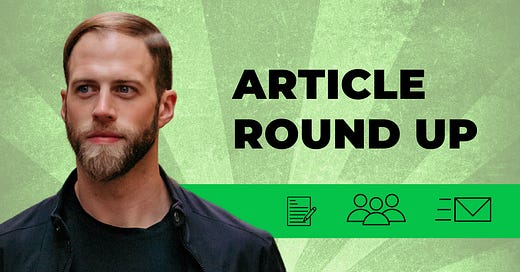Enjoy this week’s round-up of curated articles, podcasts, and more from the web to help you learn the skills to live a more fulfilling life.
Featured Thoughts: Choose Your Solutions Problems
Takeaway: This article introduced a framework for making tough decisions when there is no clear right answer. Often, we get trapped trying to find the “best” or “perfect” decision for a given situation, the one that solves all of our problems, when a perfect solution doesn’t exist. No matter what choice you make, you’re going to lose out on something.
Changing your lifestyle means you get to feel better in your body and have more energy, but it also means giving up late night drinking and eating whatever you want. No perfect choice.
Changing jobs means you’ll be less stressed, but the pay is slightly lower and the commute a little longer. Either way, you won’t be completely satisfied.
Instead, according to Feifer, invert the question. Ask yourself, “Is my new problem better than my old problem?”
I love this conceptualization. Every decision you make creates new problems.
When you change your lifestyle, you have to deal with making your own food, navigating self-control around junk food, and tempering drinking habits. Those are your new problems. The old problems were waking up in pain, not having enough energy for the day, and feeling bad about your body. The question you ask yourself is whether you want to commit to lifestyle changes or not. Do you want to deal with the old problems or the new problems?
You’re stuck in a high stress job that’s taking it’s toll on your body. Changing jobs mean significantly less stress, but the pay is lower and the commute is longer. Which set of problems would you rather have to contend with?
Instead of asking yourself which problems you’re solving, ask which ones you’re creating. Which set of problems would you rather have to deal with?
Create a list of all the new problems created by each decision. Once your list is created, review and write down solutions for each new problem. By the end, you should have lists of both problems and the things required to solve them.
Now it’s decision time.
Instead of asking which you want more, a healthier lifestyle or free reign to eat whatever, now you can ask yourself: given the problems I will face and the effort required to solve them, which sacrifices am I more willing to make?
This exercise will put into perspective what you’re actually willing to do, and should make your choices easier.
“31 Lessons I’ve Learned About Money”
Takeaway: I don’t think we talk about money enough. Sure, we might talk about what we buy, or conversely, what we can’t buy but wish we could, but we seldom talk about money habits. This is a topic I’ve begun to think about more frequently as of late, so it is only fitting this article makes the list this week.
Here are a few of my favorite insights from the list:
If you don’t take the money, they can’t tell you what to do. Money is nice, but money is only a tool to buy freedom. When you give money you’re paying for your freedom. When you’re taking money you’re giving freedom away.
If it makes you a worse person, it’s not a success. Starting that business, if it makes you bitter, ruins your relationships, or causes more stress than the benefits, then it isn’t a success no matter how much money you make.
The less expensive stuff you have, the less there is to worry about. Figure out what actually matters to you and what doesn’t. I need a car. I need it to be relatively safe, get me from A to B, and not breakdown. After those criteria are met, I don’t care about anything else. So I can find a car with a very low monthly payment and be completely satisfied. Better off, even, because I don’t deal with the added stress of maintaining an expensive car payment each month.
Give the article a skim.
“Why Some of The Smartest People Can Be So Very Stupid”
Takeaway: “Stupidity is a very specific cognitive failing. Crudely put, it occurs when you don’t have the right conceptual tools for the job. The result is an inability to make sense of what is happening and a resulting tendency to force phenomena into crude, distorting pigeonholes.”
I’m fascinated by really smart people doing really stupid things. (Myself included, albeit I’m only marginally smart.) This was an interesting way to conceptualize the presence of stupidity.
“3 Reasons You Can’t Stop Snacking (And How To Fix It)”
Takeaway: Three factors contribute to snacking behavior: pleasure, all-or-nothing thinking, and the foot-in-the-door technique. Pleasure signals in the brain after the first bite create a desire for more. All-or-nothing thinking leads to a mindset where even a small concession makes it easier to indulge further. The foot-in-the-door technique, similar to sales tactics, convinces us to continue snacking after making the initial concession of taking a bite. To overcome this, creating an environment that limits easy snacking.
P.S. This Saturday, June 3rd, in Ann Arbor, Michigan I am giving a free nutrition seminar where I’m sharing the nutrition framework I use to help clients all over the world to master weight loss in the easiest, most sustainable way. I’d love to see you there. Click here to register your spot.




